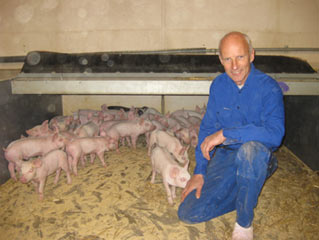Farmer says pigs’ health improved after switch from GMO to non-GMO feed
By Ken Roseboro
Published: June 1, 2012
Category: GMO Food Health Risks

lb Borup Pedersen’s believes that GM soy caused reduced fertility in his pigs
To access all the articles in this month's issue of The Organic & Non-GMO Report, SUBSCRIBE NOW.
A conventional Danish pig farmer told a leading Danish farming newspaper that the health of his pigs increased significantly after he changed their diet from genetically modified to non-GMO feed.
lb Borup Pedersen, who farms in Pilegaarden, Hvidsten, near Randers on Jylland, told the newspaper, Effektivt Landbrug, that he immediately observed positive changes in the health of the sow herd. The story was on the front page of the newspaper.
Significant improvements
Pedersen switched to non-GMO soy feed in April 2011. Within two days of the change, he found that diarrhea, which had been a major problem for female sows, virtually disappeared. Over time, sow deaths from bloat, ulcers, and loss of appetite stopped. Other improvements included easier farrowing (giving birth) and a higher farrowing rate, more live births of piglets and fewer dead piglets, stronger and more evenly sized piglets, sows with higher milk yield, and lower medication use. There was also 20-30 less hours of labor each month because of the positive changes.
Pedersen said that the savings in medications has paid for the extra cost of the non-GMO soy.
Pedersen says that dead and deformed piglets are a problem in pig farming where GM soy is used in the diet. He is convinced that this is connected to the residues of the herbicide glyphosate that are allowed in feed within the EU—20 parts per million (ppm) in corn and soybeans. He says that residues have been measured at 17 ppm in soybean meal, and that the permitted level of tolerance has been fixed at the behest of the GM industry.
Glyphosate causing health problems in pigs?
“I am convinced that Roundup causes serious birth defects especially of the head and spine in fetuses of both humans and animals,” Pedersen says.
He adds: “Independent researchers have shown Roundup to be both a powerful and non-selective biocide and an endocrine disruptor, leading to birth deformities, abortion, cancer and changes in microflora in the gut of mammals, so that Clostridia becomes a problem. This, I think, is the direct reason for chronic botulism in cattle. I know that the diarrhea and bloated sow problems which we had—and which disappeared with the changed diet—were due to Clostridia bacteria.”
Looking to the future, he says: “I am sure that Danish farmers would stop using GM soy in the feed for their animals if they knew the harmful effects it is having on animals and humans. I believe that the effects of DDT and Thalidomide can be described as trivial compared to the effects we are now seeing from the use of GMO crops that are sprayed with Roundup.”
Since Pedersen’s story became public, The Danish Pig Research Centre announced that it would carry out comparative feed studies to investigate the impact of GM soy in production pigs.
(Source: GM-Free Cymru)
© Copyright The Organic & Non-GMO Report, June 2012




